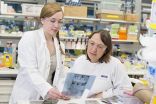(Press-News.org) Walter and Eliza Hall Institute scientists have discovered a small molecule that blocks a form of cell death that triggers inflammation, opening the door for potential new treatments for inflammatory disease such as rheumatoid arthritis, Crohn's disease and psoriasis.
The researchers made the discovery while investigating how a protein called MLKL kills cells in a process known as necroptosis. Their findings were published today in the journal Proceedings of the National Academy of Sciences.
Necroptosis is a recently discovered cell death pathway linked to immune disorders. It is a vital process in which cells undergo programmed death while warning the immune system that something has gone wrong, such as during viral infection. However when necroptosis is inappropriately activated, it can promote inflammation and the development of inflammatory disease.
Dr Joanne Hildebrand, Ms Maria Tanzer, Dr James Murphy, Associate Professor John Silke and colleagues studied how MLKL changes shape to trigger cell death. "MLKL is the final protein in the cell death pathway but it needs to be activated before it can kill the cell," Dr Hildebrand said. "Understanding how it becomes active can help uncover new ways to treat disease."
Dr Hildebrand said the research team found that a particular part of the protein became 'unlatched' when activated, allowing it to attach to the cell membrane and trigger cell death. "It's like flicking a molecular switch," she said. "We showed that when the switch can't be 'turned on', MLKL doesn't become active and necroptosis is prevented."
Ms Tanzer said the team tested a range of small molecules to see if any could stop the switching on of MLKL and had identified one that prevented MLKL from becoming active. "This small molecule binds to MLKL in such a way that it 'jams the switch' that makes it active," she said. "We are really excited by this discovery because not only have we shown this particular part of the protein is essential for necroptosis, we also have a starting point in a drug discovery program."
Dr Murphy said institute scientists would now embark on a collaborative project with Catalyst Therapeutics to develop a potent new drug based on the small molecule identified in the study. "MLKL is an appealing target because research suggests it does only one thing, which is kill the cell," he said. "Blocking this protein doesn't impact other functions of the cell, reducing the chance of unwanted side-effects."
"If we can create a compound that better targets this particular part of MLKL, we can prevent necroptosis and improve treatments for inflammatory disease."
INFORMATION:
The research was funded by the Australian National Health and Medical Research Council, the University of Melbourne, the Australian Research Council, the Australian Cancer Research Foundation and the Victorian Government.
Read the paper 'Activation of the pseudokinase MLKL unleashes the four-helix bundle domain to induce membrane localization and necroptotic cell death': http://www.pnas.org/content/early/2014/10/02/1408987111.full.pdf+html
WASHINGTON, Oct. 7, 2014 — Organic chemistry: It's among the most feared courses undergraduate science students take. Whether you call it "orgo" or "o-chem," it has reduced many hopeful scholars to tears. One professor thinks he has a solution. William Dichtel, Ph.D., of Cornell University shares his thoughts on making organic chemistry classes more interesting and relevant to students in the newest episode of Prized Science from the American Chemical Society. Watch the interview at http://youtu.be/A6j1qAOOeHs.
Subscribe to the ACS channel at http://bit.ly/ACSYoutube ...
Based on current scientific literature, gastrostomy tube (G-tube) placement or other long-term enteral access devices should be withheld or withdrawn in patients with advanced dementia or other near end-of-life conditions, according to a special report published today in the OnlineFirst version of Nutrition in Clinical Practice (NCP), the official journal of the American Society for Parenteral and Enteral Nutrition (A.S.P.E.N.).
Written by the International Clinical Ethics Section of A.S.P.E.N., the report suggests that advanced dementia be seen by health care providers ...
Past research shows physical beauty can be detrimental to women applying for masculine jobs. But belles can put the brakes on discrimination by acknowledging their looks during an interview, according to a new study led by the University of Colorado Boulder.
The paper, published in Organizational Behavior and Human Decision Processes, is the first to provide a method for curtailing such prejudice against attractive women.
In the study, when an attractive woman applied for a job typically filled by men -- a construction job -- and said, "I know I don't look like your ...
This news release is available in German.
Because of the deforestation of tropical rainforests in Brazil, significantly more carbon has been lost than was previously assumed. As scientists of the Hemholtz Centre for Environmental Research (UFZ) write in the scientific journal Nature Communications, the effect of the degradation has been underestimated in fragmented forest areas, since it was hitherto not possible to calculate the loss of the biomass at the forest edges and the higher emission of carbon dioxide. The UFZ scientists have now closed this knowledge gap. ...
If a scientist has a good reputation among his colleagues, other scientists are more likely to cite his publications. According to a study, reputation is crucial for the impact of publications.
Author reputation is key in driving a paper's citation count early in its life cycle, before a tipping point, after which reputation has much less influence compared to the paper's citation count, says Aalto University Professor Santo Fortunato, pointing out that this is a key finding of the study.
Quality – not quantity – of publications build authors' reputation
As ...
The results of a four-year international study of 2060 cardiac arrest cases across 15 hospitals published and available now on ScienceDirect. The study concludes:
The themes relating to the experience of death appear far broader than what has been understood so far, or what has been described as so called near-death experiences.
In some cases of cardiac arrest, memories of visual awareness compatible with so called out-of-body experiences may correspond with actual events.
A higher proportion of people may have vivid death experiences, but do not recall them due ...
A new study suggests that drops of fuel spilled at gas stations — which occur frequently with fill-ups — could cumulatively be causing long-term environmental damage to soil and groundwater in residential areas in close proximity to the stations.
Few studies have considered the potential environmental impact of routine gasoline spills and instead have focused on problems associated with large-scale leaks. Researchers with the Johns Hopkins Bloomberg School of Public Health, publishing online Sept. 19 in the Journal of Contaminant Hydrology, developed a mathematical ...
Washington, DC—A researcher who found that testosterone raised the risk of prostate tumors and exacerbated the effects of carcinogenic chemical exposure in rats is urging caution in prescribing testosterone therapy to men who have not been diagnosed with hypogonadism, according to a new study published in the Endocrine Society's journal Endocrinology.
Testosterone use has soared in the last decade among older men seeking to boost energy and feel younger. One study published in The Journal of Clinical Endocrinology & Metabolism found that the number of American men ...
Until now, if you want to print a greeting card for a loved one, you can use colorful graphics, fancy typefaces or special paper to enhance it. But what if you could integrate paper-thin displays into the cards, which could be printed at home and which would be able to depict self-created symbols or even react to touch? Those only some of the options computer scientists in Saarbrücken can offer.
They developed an approach that in the future will enable laypeople to print displays in any desired shape on various materials and therefore could change everyday life completely.
For ...
In a ground-breaking research project at the University of Gothenburg, seven Swedish women have had embryos reintroduced after receiving wombs from living donors. Now the first transplanted woman has delivered a baby – a healthy and normally developed boy. The world-unique birth was acknowledged in The Lancet on 5 October.
The uterus transplantation research project at the University of Gothenburg started in 1999 and has been evaluated in over 40 scientific articles. The goal of the Gothenburg project is to enable women who were born without a womb or who have lost ...




